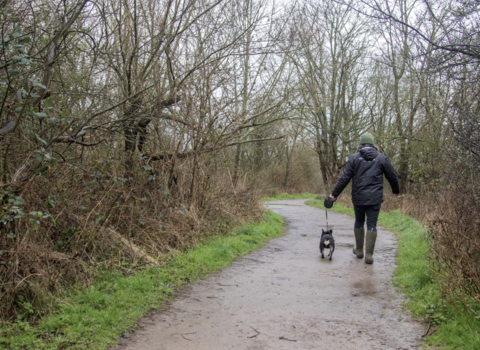Across Beds, Cambs and Northants problems caused by dogs have increased in the last few years – a statistical fact echoed by a countrywide picture. In Northamptonshire's Nene Valley Special Protection Area (SPA), a recent Bird Disturbance Survey concluded that keeping dogs on leads lowers the severity of disturbances to birds across the sites.
A recent study found that dogs off leads were four times more likely to cause disturbance than dogs on leads
The study recorded 4,937 visits to key locations in the SPA and found that dogs off leads were four times more likely to cause disturbance than dogs on leads. In total, visits by dogs off leads led to a disturbance event in 19% of instances and dogs on leads in 4.5% of instances. The study recorded 619 disturbance events and found that dogs off leads were the most common cause of bird disturbance, leading to 42% of all disturbance events, compared to dogs on leads which led to 3% of all disturbances.
Natural England rate disturbance from recreation (particularly walkers and dog owners) as the top threat to the SPA bird populations. For example, golden plover numbers within the SPA have declined significantly (76% in recent years). Disturbance from recreation affects wintering birds by reducing the time available for feeding, and increasing energy expenditure when avoiding those sources of disturbance.
Matt Johnson, Northants Conservation Manager says: “We’re asking everyone who visits our reserves to keep their dog on a lead at all times. Recent survey work has highlighted the negative impacts of dogs off leads on our important birdlife, in particular disturbance of overwintering and breeding birds. Here in Northants we’ve been working with Nene Valley Woofs to promote responsible dog ownership in the Nene Valley to better protect wetland birds, meaning our wildlife can happily coexist with our furry friends. We are running joint events this year at the Nene Wetlands and Summer Leys.”
Dr Jenna Kiddie, Head of Canine Behaviour at Dogs Trust, says: “Dogs enrich our lives, but they also bring a level of responsibility. Whilst many of us enjoy taking our dogs for long walks, especially as it becomes a bit warmer, we urge dog owners to consider their surroundings, particularly when visiting areas where they might encounter wildlife. When visiting rural areas, owners should keep their dogs under control and ensure they do not worry other animals or stray from the path, as well as dispose of their dog's waste appropriately. We would advise keeping dogs on a short lead, and close to you, especially whenever livestock are nearby. It is important to remember that chasing is normal dog behaviour, and that any dog is capable of chasing, irrelevant of breed, type, age or size.”
Dog attacks on livestock cost an estimated £2.4 million during the course of 2023, up by nearly 30% compared to the previous year, new figures show. Complacency among some dog owners alongside an inability to control their pets led to the surge, according to NFU Mutual, in an anti livestock worrying campaign last year. A survey of more than 1,100 dog owners by the insurer found that more people were letting their dogs off leads in the countryside last year than in 2022, 68% and 64% respectively. Worryingly, only less than half (49 percent) said their pet always comes back when called; almost 8% admitted their dog chases livestock, but 46% believed that their dog was not capable of causing the death or injury of farm animals. More than half (54%) felt they did not need to take active measures to prevent their dog from chasing, NFU Mutual's survey shows.
A recent ITV report showed that dog attacks in general had escalated by 22% as dog populations surged as a knock on consequence following Covid - shockingly up by 52% in Cambridgeshire and by 40% in Bedfordshire. Many dog owners are passionate about nature and want to avoid harming it -however, even the most well-behaved dogs can unintentionally cause distress or damage wildlife, simply by following their natural curiosity. Birds perceive dogs as predators; when dogs roam freely, birds may abandon their nests, leaving eggs and chicks unprotected. From designated walking paths to understanding wildlife seasons, plenty can be done to ensure everyone has a safe and enjoyable experience – on two legs or four.

